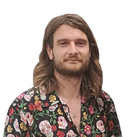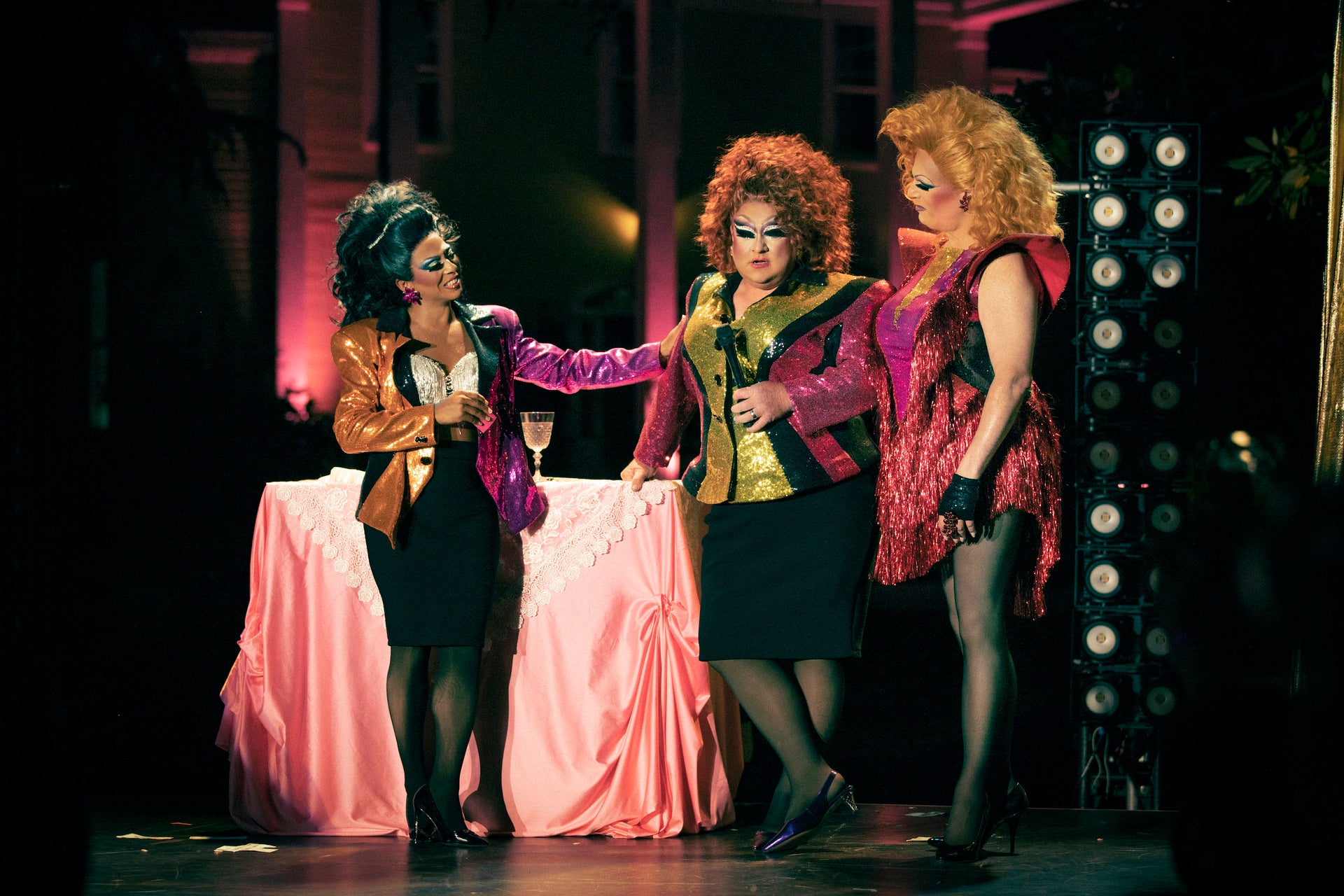We’re still here: The Drag Race queens taking on small-town America
As their glammed-up docuseries ‘We’re Here’ returns, Shangela, Bob the Drag Queen and Eureka O’Hara talk to Kevin E G Perry about queer visibility and whether road-tripping around the States has filled them with hope or fear for their country’s future


For the past couple of years, three outrageously charismatic drag queens have been making one of the most revealing shows on TV. In each episode of the Emmy-nominated HBO docuseries We’re Here, Shangela, Bob the Drag Queen and Eureka O’Hara – who all rose to fame competing on RuPaul’s Drag Race – travel to a small town somewhere in the United States. When they arrive, often to an uncertain welcome, each queen adopts a local ‘drag daughter’ to mentor. After some careful coaching and fabulous makeovers, they all come together to perform a cathartic one-night-only drag show extravaganza in front of their community.
It’s a deceptively simple premise that could have become kitschy reality TV. But in fact, the sensitively handled series is deeply compassionate in the way it tells real life stories about people finding strength and self-expression, often in the face of heinous prejudice. In doing so, it also challenges a lot of preconceived ideas about the very real divisions that cut across America, including some of those held by the queens themselves.
“The big thing about We’re Here is breaking down stereotypes,” says Shangela, her infectious energy radiating across a video call from Paris, Texas. “Not only the stereotypes that people have about us in the queer community, but also the stereotypes that we have about others, whether it’s about them being from a small town, or being from a red or a blue state.”
By way of example, Shangela points to a recent episode shot in Temecula, California, just a little over an hour’s drive outside Los Angeles. There, she coached cheerleader Andrei through a drag performance his mother ultimately refused to even attend. “When we heard we were going to Temecula, a lot of people on our crew were like: ‘Why? There ain’t no discrimination in California!’,” says Shangela with a wry laugh. “Actually, there is. There are so many places across our country where you would think they’d be really supportive of the queer community and experience – and they are not.”
More positively, Shangela adds that there are also places where they’ve been pleased to find thriving queer communities that are much stronger than they were expecting, such as the vibrant drag scene they visited in Twin Falls, Idaho. “There are places you’d go: ‘Oh, you guys would never be able to build a drag show there! Good luck!’ and then you go, and you’re really surprised,” she adds. “We unearth communities of support in some of the most unlikely places.”
Sometimes the most unlikely places of all can be within a single family. In one episode, filmed in Spartanburg, South Carolina, deep in the Bible belt, Shangela’s drag daughter is Olin, whose brother is the established drag performer Patti O’Furniture. When we first meet Olin he’s hirsute, straight and clearly way outside of his comfort zone, but he wants to get involved because of the guilt he feels that Patti once feared coming out to him. His performance becomes a touching act of reconciliation and repentance. Reader, I wept.
For We’re Here’s co-creators Johnnie Ingram and Stephen Warren the importance of shining a light on these grassroots queer communities is matched by the opportunity to prove that people can often be a lot more accepting than you might think, so long as you can get them out from behind their keyboards. “We’re fighting a war of words, and it’s all happening online,” points out Warren. “People hide behind their computers, and they’ll say whatever the f*** they want to say, but whenever you get out in the world, with the exception of some Trump caravans, generally no one’s willing to fight anything at all.”
Ingram adds that the show was in part inspired by his own childhood growing up in the “very conservative” town of Morristown, Tennessee. A place like that is “so isolated from the queer community,” he says, “and you see the glimmer of lights of what’s happening in New York and LA so you’re like: ‘I’ve got to get out of here, I need to go join my people’. Coming back to towns like that, my question was: ‘Why did I have to leave?’ What if there were thriving queer communities in small towns? The show became about going and finding them.”

Drag has become such a staple of the modern pop culture lexicon that it’s easy to assume it’s now firmly mainstream, especially judging by the recent glut of drag-themed TV shows. What sets We’re Here apart, though, is how it ventures to places where drag is less accepted, and even vibrant scenes are often hidden away behind closed doors. That means that rather than merely being transformative fairy godmothers in the style of Queer Eye, Shangela, Bob the Drag Queen and Eureka O’Hara are also frequently called upon to act as therapists and even family councillors, and each of them meets this challenge with unwavering compassion and grace.

Watch Apple TV+ free for 7 day
New subscribers only. £9.99/mo. after free trial. Plan auto-renews until cancelled.
ADVERTISEMENT. If you sign up to this service we will earn commission. This revenue helps to fund journalism across The Independent.

Watch Apple TV+ free for 7 day
New subscribers only. £9.99/mo. after free trial. Plan auto-renews until cancelled.
ADVERTISEMENT. If you sign up to this service we will earn commission. This revenue helps to fund journalism across The Independent.
Bob the Drag Queen, who was born in Columbus, Georgia, and grew up in various places around the state, agrees that it’s important for queer people to make themselves visible. She says she knew people who left the US for Canada or the UK when Donald Trump became President, but that she always felt that the thing to do was to stay and keep fighting. “It’s really weird because I feel like Trump actually usurped one of his more popular sayings, which was: ‘This will be a great America. We will be the participants in making it so’,” she says. “When I think about all the people who have already sacrificed a lot to make this a country where I can vote, and walk down the street, and have freedom, to bail on that now doesn’t seem like the right choice.”
As to whether travelling the country making We’re Here has made her an optimist or a pessimist about the future of America, Bob prefers to call herself a realist. “I’m not one of those people who blindly thinks that America is the best country in the world,” she says. “I’m also not one of those people who thinks the country is going to hell in a handbag and that it’s beyond salvage.”
She describes the country as being like a house with a leaky roof. “This is not an attack on the house, but the ceiling does need patching,” she says. “We’re not saying the house is sh**, we’re just saying it needs a few repairs.”

Eureka O’Hara concurs, pointing out that while the show is full of encouraging stories about people coming together, there were still plenty of moments during production that made it clear how much further there still is to go. “We were in Evansville, Indiana, for the Fourth of July fireworks, and when we were leaving I was riding on the back of a golf cart so I was able to see the community and how they were reacting to us,” remembers O’Hara. “There were so many parents that were jerking their kids away so they didn’t see us, or saying things under their breath. There was so much negativity.”
It may have been a depressing moment for O’Hara, but characteristically she managed to find a sparkle of joy in the gloom. “It reminded me that there’s still so much to do,” she says. “That can be depressing, but at the same time, it turned from depression to excitement because I was like: ‘Ooh b****, I’m gonna have this job for years!’” She laughs, because it’s true. “We got a lot of work to do, momma!’”
‘We’re Here’ season two comes to HBO Max on 11 October. Season one is available in the UK on Now.
Join our commenting forum
Join thought-provoking conversations, follow other Independent readers and see their replies
Comments


Bookmark popover
Removed from bookmarks